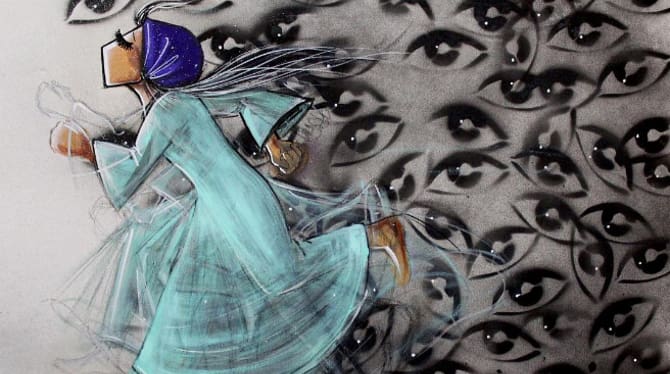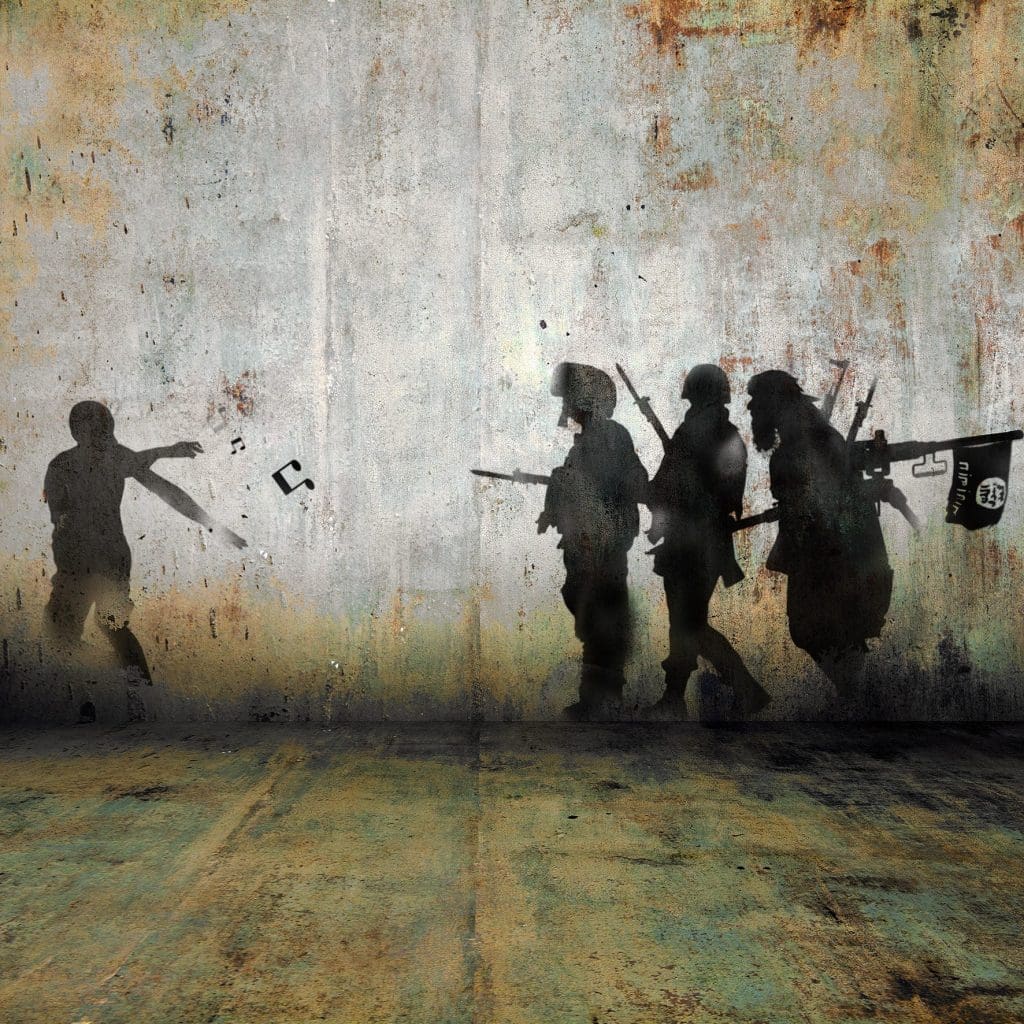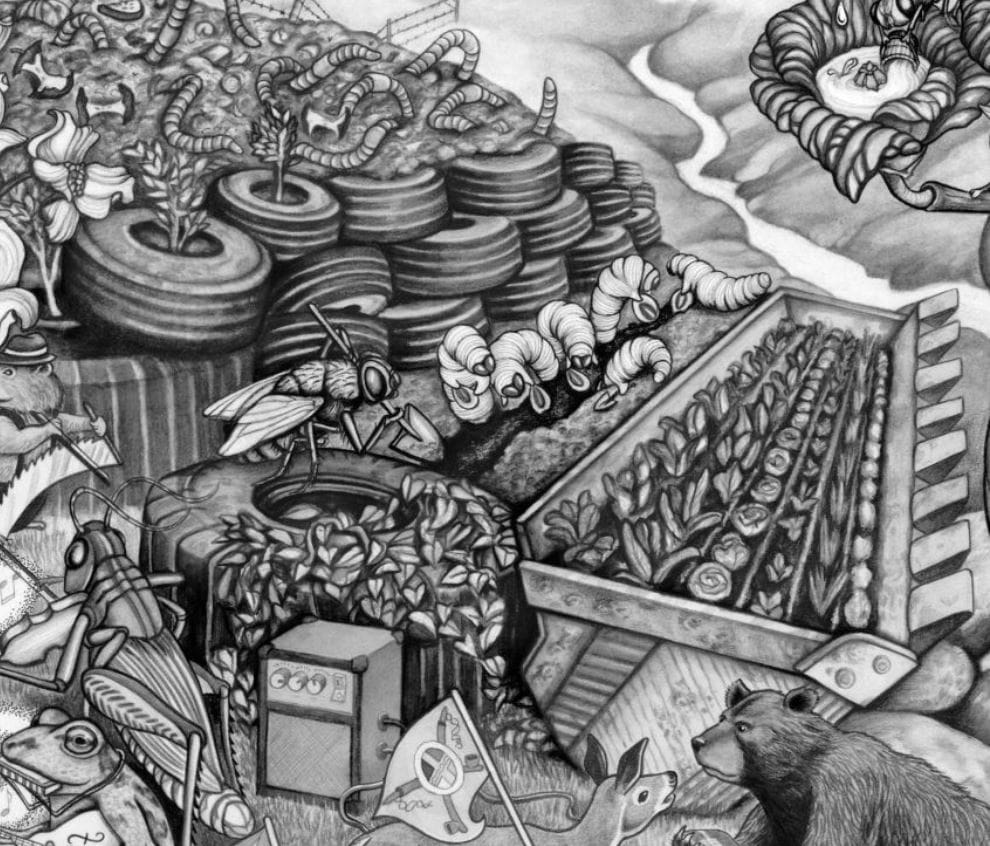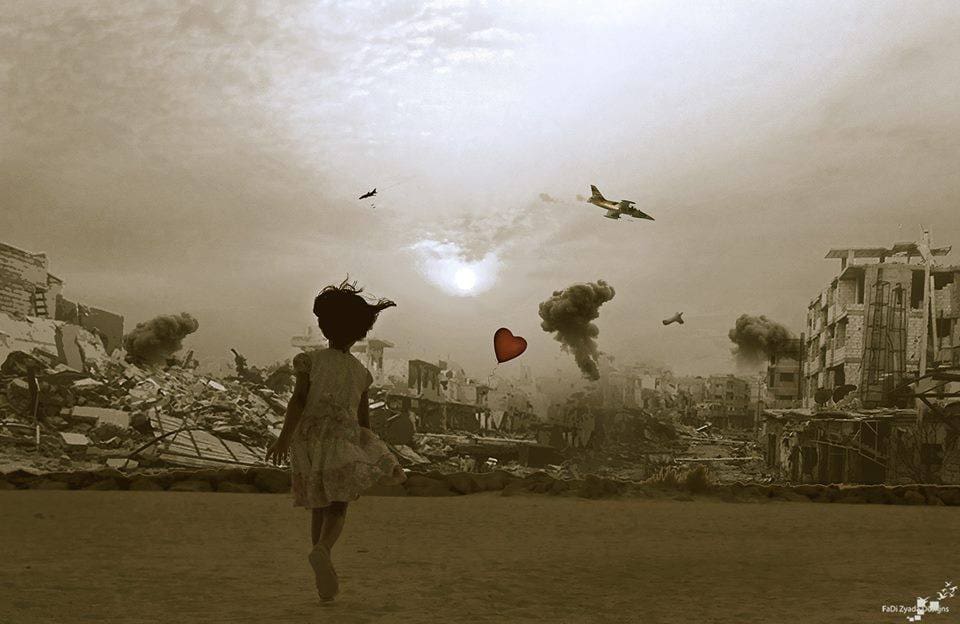AntiNote: After yesterday’s inspiring election results in Turkey, it is more important than ever to recall the concrete hopes and demands that accompanied the People’s Democratic Party’s successful bid to enter parliament and stave off the looming fascist disaster of a further empowered and emboldened AKP government, and to consider how these political developments relate to developments over the border in Rojava.
The following reflections were written in advance of the elections, but remain urgent for precisely that reason. Let us continue to build solidarity internationally for the emancipatory struggles in Bakur and Rojava (and in Istanbul and Ankara for that matter), as the HDP endeavors to alter the Turkish government’s destructive orientation towards these struggles from within.
Antidote has lightly edited this text for clarity. The original can be found here.
Thoughts of a Kurdish Anarchist on the Turkish Election and the Reconstruction of Kobanê
By Zaher Baher, Haringey Solidarity Group and Kurdistan Anarchists Forum
3 June 2015
Over two weeks in May, I visited a number of big towns in Turkish Kurdistan (Bakur), including Amed (Diyarbakır), Van, Colemêrg (Hakkâri), and Gavar. Later I returned to Suruç and was hoping to cross the border to Kobanê.
My main reason for visiting there was to investigate three important points. First, the similarities and differences between Democratic Self Administration (DSA) in Bakur and Rojava; second, the reconstruction of Kobanê; and third, the type of economy that Rojava can have in the future. Friends in the Peoples’ Democratic Party (HDP), the Working Committees of Rojava in Amed and Suruç, and other organizations tried hard to arrange my trip to Kobanê, but it did not happen.
There are two important issues to talk about.
First: The General Election in Turkey
Turkey is facing an important election. It is historical, not just for the Kurds but for all of Turkey. If president Erdoğan and his Justice and Development Party (AKP) win, they will be able to implement their hidden Islamic Democratic agenda. Human rights will suffer, police oppression will increase, and the prisons will be full of activists. The rights of individuals, women, ethnic minorities, and other religions will almost disappear. It will also be a big setback for the peace process.
On the other hand, if the People’s Democratic Party (HDP) passes the 10% election threshold, the AKP could be stopped from implementing its inhumane agenda. The HDP manifesto is very radical; even if only half of it is implemented, Turkey’s constitution could be reformed—unless the military generals take over.
I met many people in Amed, Van, Colemêrg and Gavar. Everybody was busy with the election campaign for the HDP. Everybody who I asked, from candidates and campaigners to ordinary people, believes that the election this time is a major event and anxiously look forward to seeing the results of 7 June. Their reasons for that are the following (and it is very difficult not to agree with them):
– This is the first time that the Kurdish people enter an election having a political party, the HDP. Previously, individual Kurds had only taken part in elections as independent. Inside the HDP is also the first time many non-Kurds are united with Kurds, and share the HDP’s radical manifesto, reflecting and protecting the same interests of whole parties.
– It is quite clear that the AKP is not interested in a serious peace process with the Kurdish people. Erdoğan has not taken any practical steps towards this goal. In fact, the AKP has been forced to agree to the peace process. Erdoğan and his party are calculating that the HDP will not get through the 10% threshold, and will not become a major force in the parliament to push the peace process seriously. Winning this election will be a major achievement almost for everybody in Turkey.
– The HDP manifesto is strongly connected to the life of Kurdish and non-Kurdish people. It is a political, economic, educational, cultural as well as social manifesto. It aims at equality between men and women, and at reducing poverty, unemployment, homelessness, and the power of corporations. It deals with recognizing Rojava’s Cantons, the Cyprus issue, tackling discrimination, recognizing the right of the individual, different cultures, and different religions.
– To rebuild Kobanê, humanitarian aid and materials have to enter through Syria or Turkey. Therefore reconstruction of Kobanê, whether through big corporations or through international solidarity, has to be through Turkey. At present, Turkey only allows humanitarian aid. The HDP winning the election is extremely important for rebuilding Kobanê.
Second: Democratic Self Administration in Bakur and the differences with Rojava
There are many similarities between DSA in Bakur and that of Rojava. What both experiments share are self-reliance and the belief that things can be changed and done differently. Both are creating different radical local groups, committees, people’s assemblies and Houses of People in villages, on streets, in neighborhoods and towns. In both experiments there are working volunteers making decisions collectively through a people’s assembly or the House of People. This results in bringing decisionmaking back into the hands of communities. This also leads to decentralization and weakens the authority of the state.
In both experiments, the environment is a major issue and has become an important part of the people’s agenda. Making revolution from the bottom of society is a core belief in both experiments. There is no promotion of religions or nation states.
Naturally, there are many differences between the two experiments. This is due to a different socio-political climate which gave both experiments their separate characters. Among these differences:
– DSA bodies in Rojava emerged through the current situation in Syria, Assad’s forces withdrawing, and the will and determination of people in Rojava to do what they wanted to do. The ones in Bakur have been the outcome of the long historical struggle of people under the PKK’s influence.
– DSA bodies in Rojava have been settled, and are the main administration that people trust and use. These are independent establishments and have no opponents except in Cizîrê, where some regime administration still exists. So the DSAs in Rojava are free and have open hands. On the other hand the DSAs in Bakur, in many towns and villages, have not settled completely yet. In the main towns, like Amed, Van and Colemêrg, people are in confrontation with the regime establishment. For example, in the town of Amed, there are no contacts between municipalities and the governor, the head of police or the military forces. The same situation, or even worse, can be found in the town of Van. While I was there, I was told by people I met that they started having serious problems with official authorities when they wanted to change the names of their streets to Kurdish names.
– The DSAs in Rojava have been recognized to a great extent in the world. They have received good attention, solidarity and support from leftists, communists, trade unionists, socialists, anarchists, and libertarians. In contrast, the DSAs in Bakur have been recognized as the work of the PKK—and for the US, Turkey and the West, the PKK is a terrorist organization. Their poisoning propaganda has affected the value and importance of the DSAs there.
– The continuation of the ISIS war in Rojava is costing many lives, and the stability of the region. This war also affects very badly the financial position of this area. The situation is paralyzing most of the economic, political, and social future planning. Furthermore, there are continued threats from other terror forces, like the Free Syrian Army and Assad’s forces as well. In Bakur there has not been any war to this point.
– Rojava is an agricultural region with mineral-rich soil. Equally, Bakur is a very fertile land with ample sources of water. The river Tigris flows through this region along with some other rivers. In addition, Van Lake is in the heart of Kurdistan. The area, with its high and snow covered mountains, can be a tourist attraction too. With all these resources the area can be self-sufficient, without need of the central government.
– Capitalism has not been developed in Rojava yet. There are no big corporations, companies, or factories. Therefore, the ugly face of capitalism cannot be seen there. In contrast, in Bakur there is some form of undeveloped capitalism. This is a result of a deliberate racist policy of the regime to exclude Kurdistan from major developments.
– The trade unions in Bakur are very strong and play a big role in municipalities, radical groups, people’s assemblies, and Houses of People as well as in the work place. They have good relations with the three main Turkish trade unions. Obviously the strength of unions in Bakur corresponds to the level of industrialization of Bakur, which is not as advanced as in the rest of Turkey. On the other hand the number of trade unionists and unions in Rojava are very small, therefore they have a very little role to play.
In one of my meetings with people in Van, they talked in detail about the situation there. They talked about the heavy presence of police and military forces in their area. These forces put a lot of pressure on people, with harassment, humiliation, and the threat of arrest. In spite of all this, activists there continue to further their course to progress their DSA. They work in a variety of areas, such as politics, language, health services, women, environment and agriculture. It is estimated that DSAs may manage as much as 80% of Van. There are people’s assemblies in 1,056 regional villages, and in 40% of the area there has been some form of self management. Something else worth mentioning here is women’s 50% participation in these self management organizations.
In addition to the agricultural nature of Van, the region has potential to become a great tourist attraction. The House of People in Van has future plans to have eco-tourist projects to protect people and the environment. One of the other problems facing people is poor production, due to the distracting activities of the regime’s forces. There is also a culture of lack of confidence among people, an unwillingness to share, lack of freedom and political problems.
I was told by people there that they face a mammoth task. It is not easy to overturn the influence of 500 years of Turkish authority. Throughout these years people have been marginalized, isolated and treated with utter disrespect. To change all of this requires a lot of work on the ground, and on the individual level as well. But what is promising is the zeal and determination of the activists in the area.
In my meeting with the co-president of the HDP, another party chief, and a co-leader of Colemêrg municipality, it became apparent that DSAs in the region are facing major problems. The situation gets worse the closer you get to the border. In fact, there are areas that are restricted by the military and people are not allowed to enter. Despite all this, the municipalities in Colemêrg are determined to implement their ambitious ecology plan. It has been decided to work on this project as soon as the election is over.
Kobanê and its Reconstruction
After defeating ISIS and Turkey’s regime in the war, Kobanê managed to pass its first test successfully. The US and its allies took part in the war because they realized that either Kobanê cannot be defeated or, if it goes down, it will take everything else with it. The first possibility would deprive the big corporations from rebuilding Kobanê. The second would add another black spot to the history of the “international community.”
The war and the sanctions indeed made life in Kobanê and the rest of Rojava miserable for a long time, but in my opinion both factors played a major role in bolstering the chances that the whole of Rojava will survive.
The war there introduced Rojava to the world, particularly to leftists, communists, socialists, trade unionist, anarchists and libertarians. It brought love, support and solidarity to Rojava and its people. Hundreds of people from different countries traveled there to be in the front line against ISIS, and a few of them lost their lives. Hundreds more went there as journalists and aid and community workers to show their support and solidarity.
The use of sanctions against Rojava by Turkey, the Kurdistan Regional Government (KRG) in Iraq, and other regional countries also played a role in the continuing survival of Rojava’s idea. It prevented corruption, checking the entry of money and capital, and hindered exploitation of people by businessmen and landowners. The simple life of the region managed to go on. People had to rely on themselves, work voluntarily and collectively. The true natural relation between the people continued.
Now Kobanê and the whole of Rojava enter the next test, an economic test which will be difficult indeed. Many countries can resist military occupation but cannot survive an economic one. An economic war launched by big corporations and international financial institutions can be devastating.
This may start with the reconstruction of Kobanê. Rebuilding it could either bring death or the survival of Rojava as a whole by fueling its social revolution.
In my opinion, rebuilding Kobanê may take one of the following routes:
– Either through the work of big corporations and financial institutions like the IMF and World Bank. This will no doubt benefit the corporations in particular and the capitalist system in general as happened, by imposing so many dramatic conditions, in Africa and South America.
– Or through international support and solidarity of leftists, communists, trade unionists, socialists, anarchists and libertarians. This, of course, is a slow process but it is the only way that Kobanê can be rebuilt solidly meanwhile avoiding the influence of big corporations.
– It could also be done by contracting out some of the projects to some companies to supply materials and expertise but the actual work would be done collectively by the people. This option is being closely examined by the DSAs and the Tev-Dem (Movement for a Democratic Society in Rojava) and could be imposed.
There is currently a big discussion among politicians, academics and economists about the rebuilding of Kobanê and the future economy of Rojava. In fact, a big conference was held in Amed in early May regarding rebuilding Kobanê, but so far no decision has been taken. While I was in Bakur I spoke to many people in important positions. They all rejected big corporations and explained that this is their official and firm view.
Deciding against rebuilding Kobanê through big corporations and international financial institutions is an excellent decision that keeps the powers and interests of the US and Western countries out. In the meantime it is the duty of all of us to help and support in whatever way we can and to participate in the reconstruction of Kobanê in order to protect this shiny experiment. We should not allow the blood of the thousands of people who sacrificed themselves to liberate Kobanê and protect the social revolution in Rojava to have been given in vain.
Source: the anarchist news portal InfoShop
Featured image source: Al Tahrir blog





